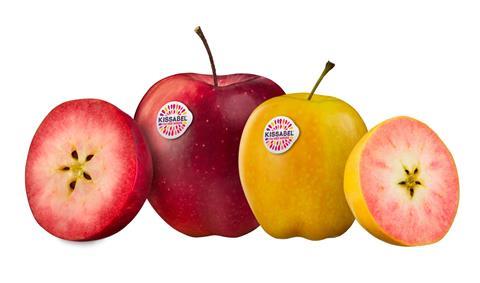
The companies behind Kissabel, a series of red- and pink-fleshed apple varieties, say they seeing growth in commercial demand that is far beyond the volume of fruit available.
Despite the obvious challenges associated with the Covid-19 pandemic, which has limited opportunities to sell directly to consumers, the brand certainly looks well placed to capture a greater share of the apple market.
In the UK for example, it already offers a real point of difference in a market that is worth £1 billion. “I firmly believe that Kissabel is one of the most exciting varietal developments,” comments Jeremy Linsell, technical and performance development officer at Worldwide Fruit, and one of the first growers to plant two yellow-skinned Kissabel varieties in the country.
Commercial director Hannah McIlfatrick says Worldwide Fruit is 'extremely excited about the product’s arrival. “Kissabel brings something truly unique to the category, with its distinct red-pink flesh colour and deliciously fresh crisp taste.”
Reaction to the apples from commercial partners has been good. “The feedback has been good, and the customers like it,” says Anna Coxe, head of technical and quality at Greenyard. “We have a positive feeling about the level of demand for next season.”
Connecting with consumers
A special campaign last Halloween, which encouraged consumers to discover a ‘frightful surprise’ inside the fruit, reportedly contributed to 119 per cent annual sales growth.
“More and more consumers want to try special and different products, with an emphasis on locally sourced, seasonal produce,” says Victoria Cliff, marketing manager at Worldwide Fruit. “Halloween continues to provide the perfect stage for Kissabel, which provides the perfect wow factor.”
Marketing has also made an impact in Germany. “The Halloween edition was perceived especially well,“ recalls Wolfgang Kreiser, director of Red Apple Germany. “The red-fleshed apples attracted attention from retailers as well as shoppers.”
His organisation has planted more Kissabel Rouge trees to meet expected higher demand in future. “Although Kissabel will remain a niche product for us, it has proven to be successful in its niche,“ he adds. “We saw huge interest in and demand for Kissabel pre-season – even to the extent that we couldn’t meet all of our customers’ requests.”
Kissabel has the support of companies in Italy, where strong demand reflects the brand’s great promise. “We don’t see any problem with having larger volumes available in future, because its uniqueness makes it unrivalled,” explains Andrea Fedrizzi, marketing and communications manager at Italian group Melinda.
Together, Melinda and South Tyrolean companies VIP and VOG have planted around 17ha in Italy with Kissabel Rouge apples. They expect to sell a combined volume of 300 tonnes this year, doubling that in 2022 before reaching 900 tonnes in 2023. Meanwhile, Piedmont-based supplier Rivoira will also begin planting another type of Kissabel Rouge next year.
Importantly, Kissabel represents not one but several highly distinctive additions to the apple category. Marketed as Kissabel Rouge, Orange, or Jaune, a number of different red-, orange- and yellow-skinned varieties offer a range of appealing flavours.
“I think it is very important to focus attention on their very distinctive tastes, which lend themselves to different uses and to tasting Kissabel apples at all times of the day, and can win over consumers in different countries,” observes Fabio Zanesco, VIP’s sales and marketing manager.
Early customer feedback has been good: “We sold around 80 tonnes of Kissabel in weeks 44-48, 72 per cent of it Italy and 28 per cent in Scandinavia,” he reveals.
Although Covid has prevented in-store tastings during the past 12 months, this does not mean direct marketing to consumers has stopped. “Through clear and direct visual communication in store, we were still able to convey the variety’s added value,” explains Fedrizzi. “Even in the absence of tastings, this generated excellent results.”
More volume needed
The trend is a similar one in France, according to Jean Nicolas Blouet of Mesfruits. “In France and the UK, all of our customers would have kept buying if there had been more volume to sell.” he comments. “All of our clients are going to buy again next year. It is already a rendezvous!”
Also in France, Blue Whale’s commercial export director Marc Peyres is very optimistic about the brand’s prospects. “We are really happy to be working with this completely new and unique apple. They are amazing on the inside, they look good, and they taste good too.”
Kissabel is making progress in Switzerland as well. Christian Bertholet is fruit category manager at Swiss company Fenaco, which has worked hard to build awareness of the brand among its customer base.
“All the major retail chains included the red-skinned variety in their ranges,” he says. “We sent all our customers a sample at the beginning of the season, then in the second part of the season we reminded them all that we were still present in the market. Customers appreciated this innovation.”
Emmanuel de Lapparent, who manages the Ifored programme that oversees Kissabel’s development, sees a bright future ahead for the brand. “2020 was the second significant commercial campaign in Europe, and it is clearly showing great prospects for the coming years. Kissabel is proving to be a real innovation in the apple category.”



